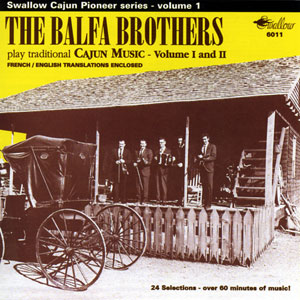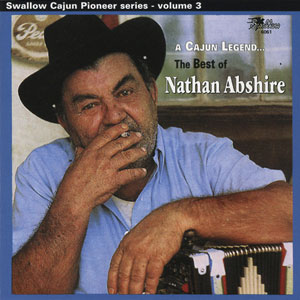The Balfa Brothers
“Guardians of Cajun Tradition”
Quick Intro
The Balfa Brothers—Dewey, Will, Rodney, Harry, and Burkeman—were a legendary Cajun ensemble from Bayou Grand Louis near Mamou, Louisiana. Their music, rooted in family tradition and rural life, helped revive and preserve Cajun culture during a time of decline. Recording for Swallow Records and performing internationally, they became ambassadors of French Louisiana’s musical heritage.
In-Depth Profile
Raised on a sharecropper’s farm, the Balfa brothers learned music from their father, Charles Balfa, a fiddler and singer. They began performing together in the 1940s at family gatherings and local dances. Their first recording, made in 1951 with accordionist Hadley Fontenot, featured “La Valse de Bon Baurche” and “Le Two Step de Ville Platte,” cut directly in their home.
In 1967, the group formally adopted the name The Balfa Brothers and began touring widely. Their lineup included Dewey (fiddle, vocals), Will (fiddle), Rodney (guitar, harmonica, vocals), Harry (accordion), and Burkeman (triangle, spoons). Joined by Dewey’s daughter Nelda and Fontenot, they played folk festivals across the U.S. and Europe, including the 1968 Summer Olympics in Mexico City.
They recorded extensively for Swallow Records, releasing albums like Play Traditional Cajun Music and The Good Times Are Killing Me. Their music was raw, rhythmic, and deeply rooted in Acadian tradition, featuring fiddle and accordion interplay, French vocals, and syncopated percussion. They appeared in the documentary Spend It All (1972), and their songs were featured in films like Southern Comfort (1981), The Big Easy (1986), and Beasts of the Southern Wild (2012).
Tragedy struck in 1979 when Rodney and Will died in a car accident. Dewey continued performing under the Balfa name until his death in 1992. The family legacy lives on through Dewey’s daughter Christine Balfa and her band Balfa Toujours.
Signature Tracks
- “La Danse de Mardi Gras” — a haunting, iconic Mardi Gras melody featured in multiple films
- “Parlez-nous à Boire” — performed in Southern Comfort, showcasing their lively dancehall style
- “La Valse de Bon Baurche” — their first recorded waltz, full of rural charm
Notable Accomplishments & Awards
- Recorded for Swallow Records, Sonet, Valcour, and Rounder
- Performed at the 1968 Summer Olympics in Mexico City
- Featured in the documentary Spend It All (1972)
- Music featured in Southern Comfort, The Big Easy, Passion Fish, and Beasts of the Southern Wild
Bonus Notes
- Played eight dances a week at Hick’s Wagonwheel Club in their early years
- Helped spark the Cajun cultural renaissance of the late 1960s
- Christine Balfa, Dewey’s daughter, continues the legacy with Balfa Toujours
Discography Highlights
- Play Traditional Cajun Music (Swallow Records, 1967)
- The Good Times Are Killing Me (Swallow Records, 1972)
- J’ai Vu le Loup, Le Renard et la Belette (Cezame, 1975; reissued by Rounder, 1988)
- The New York Concerts (Swallow Records, 1980)
- The Balfa Brothers & Nathan Abshire (Field Recorders’ Collective, 2008)
- The Balfa Family: A Retrospective (Valcour Records, 2012)
Album Reviews
The Beat
Nathan Abshire – The Best Of… A Cajun Legend and Dewey Balfa – Cajun Legend
Written by Stephen Beaumont
When people in the “business” refer to roots music, often forgotten are some of the wonderful styles fostered and developed in North America. One such tradition is Cajun music. One of the foremost recent stylists of this music was Nathan Abshire. An accordionist’s accordionist, he picked up the squeezebox at age 6 and never put it down. He played the music the way it was meant to be played – with heart and passion.
Fortunately, when he died in 1981, Abshire left a legacy of tremendous music, much of which is found on this “best of” CD. From the jubilant cry that kicks off “Pine Grove Blues” to the “last dance” feel of “Partie A Grand Basile“, Abshire guides us through an hour of joyful and spirited celebration. Led by his accordion, backed by the rhythms of the Balfa Brothers and punctuated by emotional if occasionally piercing vocals, this collection is a moving tribute to a culture that has struggled for years and, thankfully, persevered.
Another carrier of the Cajun cultural torch is Dewey Balfa, the fiddler from the old Balfa Brothers band. On his own since the deaths of his siblings Rodney and Will in 1979, Dewey has continued in his role as a Cajun musical ambassador ever since. Unlike Abshire’s music, Balfa’s style is fiddle-driven with the accordion more in the background. The fiddle is a versatile instrument, and in the master’s hands it shows all of its moods, from jubilant to mournful and everything in between.
The 21 cuts are mostly instrumentals. This, however, in no way diminishes the impact of the music. With the help of his son Tony on guitar, daughter Christine on triangle, father-son fiddle combination Tracy and Peter Schwarz, young accordionist Robert Jardell and others, the elder Balfa crafts a finely honed collection of Southern songs that are comfortable to dance to or to enjoy relaxing in your favorite chair.


